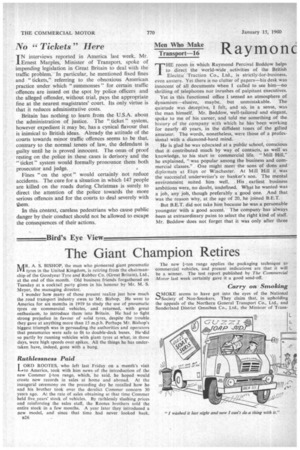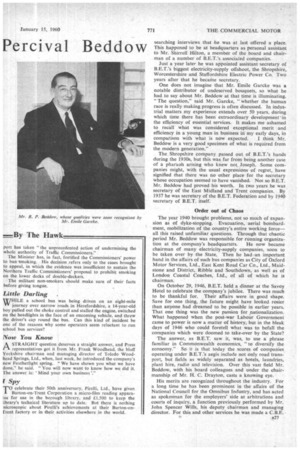Raymonc Percival Beddow
Page 32

Page 33

If you've noticed an error in this article please click here to report it so we can fix it.
Men Who Make Transport-16 THE room in which Raymond Percival Beddow helps to direct the world-wide , activities of the British Electric Traction Co., Ltd., is strictly-for-business, even austere. Yet there is no clutter of papers—his desk was innocent of all documents when I called to see him—no shrilling of telephones nor inrushes of palpitant executives.
Yet in this functional office I sensed an atmosphere of dynamism—elusive, maybe, but unmistakable. The quietude was deceptive, I felt, and so, in a sense, was the man himself.' Mr. Beddow, well-tailored and elegant, spoke to me of his career, and told me something of the history of the company with which he has been working for nearly 40 years, in the diffident tones of the gifted amateur. The words, nonetheless, were those of a profes sional with a diamond-hard mind. .
He is glad he was educated at a public school, conscious that it contributed much by way of contacts, as well as knowledge, to his start in commercial life. "Mill Hill," he explained, "was popular among the business and commercial classes." One might meet the sons 9f dons and diplomats at Eton or Winchester. At Mill Hill it was the successful underwriter's or banker's son. The mental environment suited him well. His earliest business ambitions were, no doubt, undefined. What he wanted was a job, any job, though preferably a good one. And that was the reason why, at the age of 20, he joined B.E.T.
But B.E.T. did not take him because he was a personable youngster with a' good accent. The company has always been at extraordinary pains to select the right kind of staff. Mr. Beddow does not forget that it was only after three searching interviews that he was at last offered a place. This happened to be at headquarters as personal assistant to Mr. Shirreff Hilton, a member of the board and chairman of a number of B.E.T.'s associated companies.
Just a year later he was appointed assistant secretary of B.E.T.'s biggest electricity-supply offshoot, the Shropshire,. Worcestershire and Staffordshire Electric Power Co. Two years after that he becaine secretary.
One does not imagine that Mr. Emile Garcke was a notable distributor of undeserved bouquets, so what he had to say about Mr. Beddow at that time is illuminating. "The question," said Mr. Garcke, "whether the human race is really making progress is often discussed. In industrial matters my experience extends over 50 years, during which time there has been extraordinary development' in the efficiency of essential services. It makes me ashamed to recall what was considered exceptional merit and efficiency in a young man in business in my early days, in comparison with what is now expected. I think Mr. Beddow is a very good specimen of what is required from the modern generation."
The Shropshire company passed out of B.E.T.'s hands during the 1930s, but this was far from being another case of a pharaoh arising who knew not Joseph. Some companies might, with the usual expressions of regret, have signified that there was no other place for the secretary whose occupation seemed to have vanished. Not so B.E.T. Mr. Beddow had proved his worth. In two years he was• secretary of the East Midland and Trent companies. By 1937 he was secretary of the B.E.T. Federation and by 1940 secretary of B.E.T. itself.
Order out of Chaos
The year 1940 brought problems, not so much of expansion as of dyke-stopping. Evacuation, aerial bombardment, mobilization of the country's entire working force— all this raised unfamiliar questions. Through that chaotic period Mr. Beddow was responsible for running organiza tion at the company's headquarters. He now became chairman of many electricity-supply companies, soon to be taken over by the State, Then he had an important hand in the affairs of such bus companies as City of Oxford Motor Services, Ltd., East Kent Road Car Co., Ltd., Maidstone and District, Ribble and Southdown, as well as of London Coastal Coaches, Ltd., of all of which he is chairman.
On October 29, 1946, B.E.T. held a dinner at the Savoy Hotel to celebrate the company's jubilee. There was much to be thankful for. Their affairs were in good shape. Save for one thing, the future might have looked rosier than anyone had dreamed to be possible in earlier years. That one thing was the new passion for nationalization. What happened when the post-war Labour Government came to power is now a matter of history, but in the bleak days of 1946 who could foretell what was to befall the companies which were doomed to take-over by the State?
The answer, as B.E.T. saw it, was, to use a phrase familiar in Commonwealth economics, "to diversify the economy." So it is that today the scores of companies operating under B.E.T.'s aegis include not only road transport, but fields as widely separated as hotels, laundries, plant hire, radio and television. Over this vast field Mr. Beddow, with his board colleagues and under the chairmanship of Mr. H. C. Drayton, casts a knowing eye.
His merits are recognized throughout the industry. For a long time he has been prominent in the affairs of the National Council for the Omnibus Industry, and has acted as spokesman for the employers' side at arbitrations and courts of inquiry, a function previously performed by Mr. John Spencer Wills, his deputy chairman and managing director. For this and other services he was made a C.B.E.












































































































